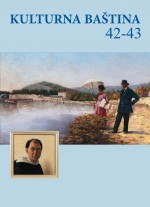Uglednici iz splitskoga roda Bulata
The Bulat Family from Split as the Source of Distinguished Individuals
Author(s): Milan IvaniševićSubject(s): Local History / Microhistory, Social history, Recent History (1900 till today), 19th Century
Published by: DRUŠTVO PRIJATELJA KULTURNE BAŠTINE - SPLIT
Keywords: Split; Šibenik; lineage; Bulat; dignitaries in lineage;
Summary/Abstract: Having been misled by a number of unreliable sources on the Bulat family, the author has decided to analyse the Split and the Šibenik branches with specific emphasis on renowned individuals. Those were: Gajo Filomen (1836 ‒ 1900), Gajo (1867 ‒ 1927), Anka (1899 ‒ 1987) i Edo (1901 ‒ 1984). Gajo Filomen, PhD (Legal Studies) was both a barrister and a politician, who participated in the activities of the Dalmatian Assembly in Zadar and the Imperial Council House of Deputies in Vienna. He was a strong advocate of various issues of public interest, such as publishing the newspaper Il Nazionalein the Croatian language in Zadar; establishing the public library, the party bank, the cultural association and the newspaper Narod in Split, et al. In Split, he participated in the work of the Town Council, first as its vice president and then as its president. His accomplishments, while in office, were, as follows: the introduction of the Croatian language in the curriculum of the two grammar schools; the renovation of the council building, the construction of the new theatre building; the introduction of Croatian as the official language of court procedures. Gajo was Gajo Filomen's nephew, that is, the son of his elder brother Eduard. He held a PhD in Legal Studies and was also a barrister.In Austria-Hugary, he advocated Croatian national interests whereas in the Kingdom of Yugoslaviahe supported the idea of integrated Yugoslavism. He also participated in the activities of the Dalmatian Assembly in Zadar. Anka was Gajo's daughter. She received her PhD in the Art History at the University of Zagreb Faculty of Philosophy. Anka wrote about the 18th- and 19th-century Croatian male and female painters and curated numerous exhibitions in the Museum of Arts and Crafts in Zagreb. Edo was Gajo's son. After he received his PhD in Legal Studies, he started to work as a barrister. He participated in political activities in two parties before the Second World War, and finally supported the fascist Ustasha movement. Consequently, he was appointed minister in the Independent State of Croatia, the so-calld NDH. After the war ended, he fled to Argentina, where he spent the rest of his life.
Journal: KULTURNA BAŠTINA : ČASOPIS ZA PITANJA PROŠLOSTI SPLITSKOGA PODRUČJA
- Issue Year: 2017
- Issue No: 42-43
- Page Range: 51-60
- Page Count: 10
- Language: Croatian

